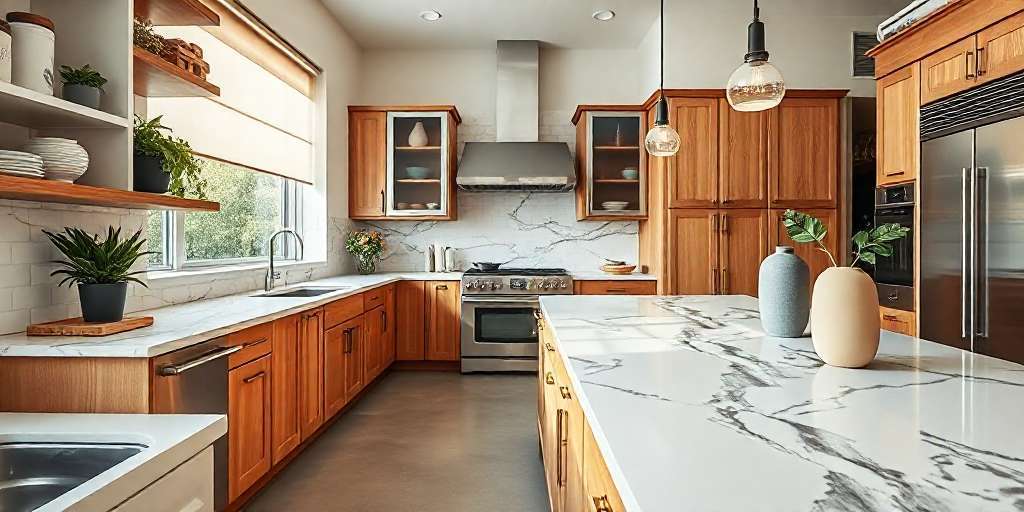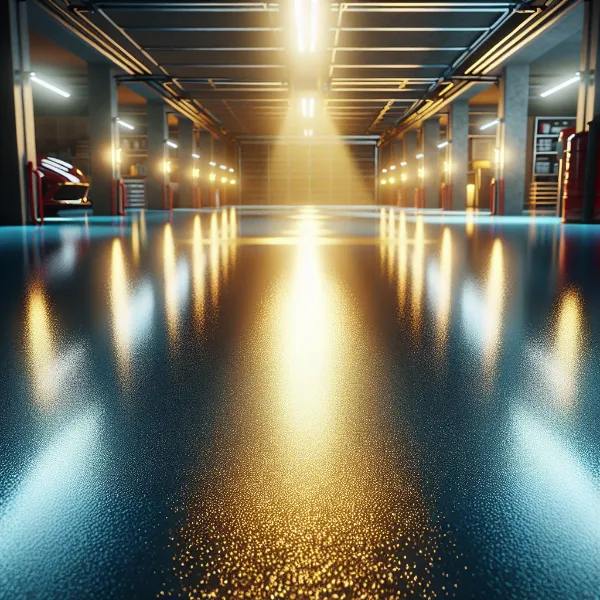Epoxy Resin Countertops
A Complete Guide to Style and Durability
Epoxy resin countertops have gained popularity for their aesthetic appeal and durability. They are made by applying a resin mixture over various surfaces, creating a glossy and customizable finish. This guide covers everything from understanding epoxy resin to installation, maintenance, and comparison with other materials. It provides essential information for those considering epoxy as a countertop option.

Understanding Epoxy Resin for Countertops
Epoxy resin is a versatile material commonly used in countertop applications. Its unique properties make it an excellent choice for enhancing and revitalizing surfaces.
What Is Epoxy Resin?
This synthetic resin consists of two main components: the resin itself and a hardener. When mixed, these elements undergo a chemical reaction that creates a durable, strong finish. Epoxy resin is known for its high surface tension, which helps it to form a non-porous layer that is resistant to stains and moisture.
How Epoxy Resin Works on Countertops
The application of epoxy resin involves several steps, starting with surface preparation, followed by mixing and pouring the resin. Its self-leveling properties ensure a smooth, glossy finish, while its curing process enhances the bond to the substrate. When applied correctly, it can transform various materials, improving both aesthetics and functionality.
Types of Epoxy Resin Kits Available
There are various kits available for epoxy application, catering to different needs and skill levels.
Professional vs. DIY Kits
- Professional kits often include higher-grade materials and precise measurements, suitable for contractors and experienced users.
- DIY kits are designed for homeowners or hobbyists, providing everything needed for a successful project, including simplified instructions.
Tools and Supplies Included in Kits
Standard kits generally contain:
- Epoxy resin and hardener
- Mixing containers and sticks
- Application tools, such as brushes or rollers
- Protective gloves and sometimes a finishing kit
Step-by-Step Guide to Applying Epoxy Resin on Countertops
Applying epoxy resin on countertops can transform any surface into a stunning focal point. This step-by-step guide outlines the essential techniques for a successful application.
Surface Preparation Techniques
Proper preparation of the countertop surface is vital to ensure the epoxy adheres correctly. A well-prepared surface will enhance the final appearance and durability of the resin finish.
Cleaning and Sanding Your Countertop
Start by thoroughly cleaning the surface to remove dirt, grease, and debris. Sanding plays a crucial role in creating a texture for better adhesion. Use a medium-grit sandpaper to scuff the surface, followed by fine-grit sandpaper for smoothness. Wipe down the surface with a damp cloth to remove any dust particles.
Using Sealers Before Epoxy Application
Applying a sealer may be necessary, depending on the countertop material. Sealers help prevent air bubbles and promote adhesion. Let the sealer dry completely before moving on to the epoxy application.
Mixing and Applying the Epoxy Coat
Correctly mixing the epoxy resin components is essential for achieving optimal results. Follow the manufacturer’s instructions for ratios and mixing times.
Techniques for Avoiding Bubbles and Drips
To minimize air bubbles, mix the epoxy slowly and avoid vigorous stirring. Use a torch or heat gun to eliminate remaining bubbles after pouring the resin. Drips can be managed by applying the epoxy in thin, even layers.
Layering and Curing Times
For better results, apply multiple thin layers rather than one thick layer. Follow the recommended curing times between layers, which can vary based on the specific resin product. Typically, a full cure can take from several hours up to a few days, depending on environmental conditions.
Finishing and Polishing Epoxy Countertops
Finishing touches can significantly enhance the overall sheen and smoothness of the epoxy surface.
Removing Imperfections
If any imperfections are noticeable after the curing process, light sanding can help. Follow up with a damp cloth to remove dust before applying a final coat.
Achieving a Glossy Finish
To obtain a high-gloss finish, consider polishing the surface after the epoxy has fully cured. Use a fine polishing compound and buff it with a soft cloth. This step will give the countertop an eye-catching shine.
Maintenance and Cleaning of Epoxy Resin Countertops
Proper maintenance and cleaning are essential to keep epoxy resin countertops looking pristine and prolong their lifespan. Regular upkeep helps prevent damage and maintain their glossy appearance.
Daily Cleaning Tips
To ensure the longevity of epoxy resin countertops, a consistent cleaning routine is recommended. Here are some effective practices:
- Wipe down the surface daily with a soft cloth or sponge to remove crumbs and spills.
- Use a gentle all-purpose cleaner diluted with water to avoid harsh chemicals that could harm the finish.
- Avoid using abrasive scrubbers, as these can scratch the surface.
Safe Cleaning Products to Use
When selecting cleaning products, ensure they are safe for use on epoxy surfaces. Look for:
- Non-toxic and biodegradable cleaners.
- pH-balanced solutions that won’t degrade the epoxy.
Avoiding Damage and Stains
To minimize staining and damage, it is important to clean spills immediately. Foods and beverages with high acidity, such as citrus juices and vinegar, can cause discoloration if left on the surface for too long.
Handling Stubborn Stains and Repairs
Even with proper cleaning, some stains may become persistent over time. Taking the right approach to these issues is key.
DIY Repair Kits and Methods
For minor repairs and touch-ups, consider using DIY epoxy repair kits that are available in most hardware stores. These kits typically include:
- Resin mixtures for filling scratches and chips.
- Sandpaper to smooth out repaired areas.
When to Consult a Professional
If the damage is extensive or if stains prove to be too difficult to remove, seeking the help of a professional is advisable. Experts can assess the condition of the countertop and provide effective restoration solutions.
Comparing Epoxy Resin Countertops to Other Materials
When selecting countertop materials, understanding how epoxy resin stacks up against alternatives is essential. This analysis covers the key comparisons with quartz and stone surfaces.
Epoxy Resin vs. Quartz Countertops
Both epoxy resin and quartz offer unique benefits for countertop applications, yet each has specific characteristics that differentiate them.
- Aesthetic Appeal: Epoxy resin is highly customizable, allowing for intricate designs and vibrant colors. Quartz, consisting of natural stone and resin, presents a more uniform look.
- Durability: Both materials are durable, but quartz is generally more resistant to scratching and heat. Epoxy resin can be prone to minor scratches, though it maintains a glossy finish.
- Cost: Epoxy resin tends to be more affordable, particularly when opting for DIY kits. Quartz countertops usually require professional installation, leading to higher costs.
Epoxy Resin vs. Granite and Marble
Granite and marble are traditional options known for their natural beauty and sophistication. Comparing these stone surfaces to epoxy resin reveals several distinctions.
- Maintenance: Granite and marble require regular sealing to prevent staining. In contrast, epoxy resin is non-porous, making it more resistant to stains.
- Installation Complexity: Installing stone countertops often necessitates professional help due to their weight and intricacies. Epoxy resin can be applied with less specialized skill through DIY kits.
- Customization: Epoxy resin allows homeowners to create personalized aesthetics, while granite and marble offer limited color and pattern variations based on natural stone availability.
Pros and Cons of Epoxy Compared to Stone Surfaces
Ultimately, the advantages and disadvantages of epoxy resin countertops relative to stone surfaces are important to consider.
- Pros:
- High degree of customization.
- Less expensive than most stone options.
- Simple installation process for DIY enthusiasts.
- Cons:
- Potential for minor scratches.
- Requires careful maintenance to avoid discoloration.
- Possibly shorter lifespan compared to high-quality stone surfaces.
Cost and Where to Shop for Epoxy Resin Countertop Kits
Understanding the financial aspects and shopping options for epoxy resin countertop kits is crucial for successful home improvement projects. Prices can vary significantly based on quality and brand.
Price Range for DIY Kits and Professional Installation
The cost of epoxy resin countertop kits varies, with DIY kits typically ranging from $100 to $200. These kits include the essentials needed for home installation but may differ in quality and ease of use. Professional installation can elevate your expenses substantially, often costing between $100 to $200 per square foot. This additional cost may offer peace of mind, as experienced professionals handle the complexities of the application process.
Finding Quality Epoxy Resin Products and Supplies
When searching for epoxy resin kits, it’s essential to choose quality products to ensure longevity and aesthetic appeal. Look for reputable brands recognized for their durability and finish.
Recommended Shops and Online Retailers
- Local home improvement stores such as Home Depot and Lowe’s often carry a selection of epoxy resin kits.
- Specialty online retailers like Amazon or specialty craft shops provide a wider range of options and reviews.
- Consider checking manufacturer websites directly for exclusive offers and detailed product information.
Choosing the Right Kit for Your Project
Selecting the appropriate epoxy resin kit is essential for achieving desired results. Evaluate your project needs by considering the following:
- Project size and surface area that requires coverage.
- Whether you prefer a DIY approach or professional application.
- The specific features you look for, such as color options and formulation.
Design Possibilities and Customization with Epoxy Countertops
Creativity permeates the world of epoxy countertops, offering endless opportunities for personalization. With a variety of options available, transforming any space is both exciting and accessible.
Color Options and Effects
Choosing the right color scheme is essential for achieving the desired aesthetic. Epoxy resin can be tinted in numerous shades, allowing for vibrant or subtle looks, depending on the style envisioned.
Custom Patterns and Textures
Unique patterns and textures elevate the visual appeal. Techniques such as swirling, marbling, or layering different colors create captivating designs that can suit both modern and traditional interiors.
Using Pigments and Additives
Pigments and additives can enhance the overall appearance. Metallic powders and shimmering effects can lend a luxurious feel, while glow-in-the-dark additives can introduce a fun twist for creative applications.
Incorporating Epoxy Countertops in Your Space
Epoxy countertops seamlessly integrate into various environments, both indoors and outdoors. Their versatility allows for cohesive design across different areas.
Indoor vs. Outdoor Applications
While perfect for kitchens and bathrooms, epoxy countertops also excel in outdoor spaces. They withstand weather elements when properly sealed, making them ideal for patios or outdoor kitchens.
Matching Epoxy Surfaces with Flooring and Fixtures
Harmonizing countertops with existing flooring and fixtures creates a unified look. Consider complementary colors and materials to ensure a cohesive design theme throughout the space.







